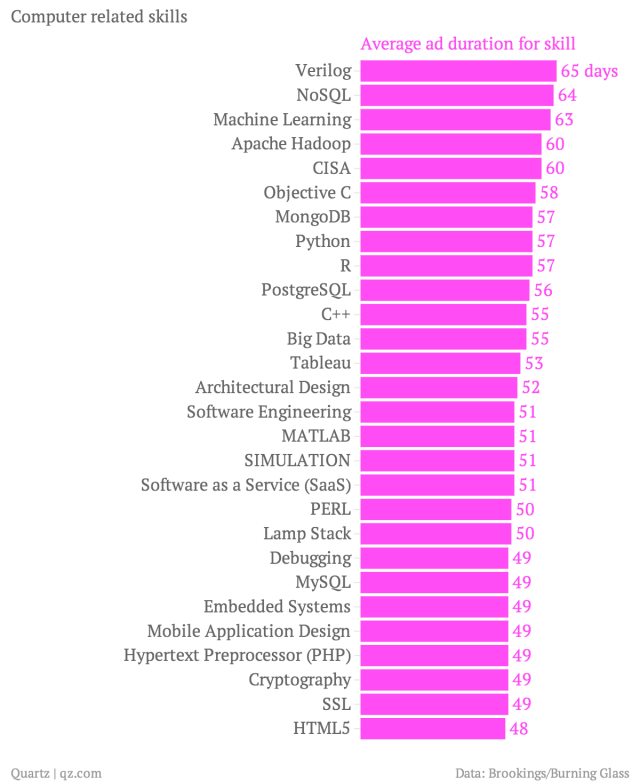You’ve just completed your Full Stack Web Developer bootcamp. Now what? It’s time to land your first job in tech. To get there, you’ll have to ace a tech interview. This piece will show you how to ace the tech interview, as well as other tips for landing your first job in tech.
First, here’s the good news: tech jobs are in high demand. Thousands of US job ads were analysed on the Quartz website – i.e. when the ads were put up and when they were taken down – to see how long it took to fill certain skills. The results showed that IT jobs took the longest to fill. Google, for example, took 97 days to fill IT-related jobs, primarily software engineers. On average, tech jobs stayed open 15 days longer – i.e. are harder to fill – than non-tech jobs. Check out the graph below to see the average ad duration for each specific developer skill.

Despite the demand for tech skills, the tech interview process can be a minefield, because your technical knowledge is frequently tested (we’ll go into more detail about what you can expect – and, most importantly, how you can prepare – later in the piece), but before landing that interview, you’ll need to make sure your CV (or resume) is top-notch.
It should go without saying, but you need to emphasise your technical skills, states Nesco Resources, a staffing and recruitment agency. You want to highlight each specific qualification or skill by creating subcategories. Only list those programs or applications with which you feel comfortable. Here’s a good tip: use keywords. How do you do this? Go to any job boards – e.g. Indeed, CareerBuilder or Glassdoor – and see which keywords are used for jobs that interest you. Incorporate these words into your resume. Include additional accomplishments such as voluntary work experience, contract work and internships. Monster, a job portal sites, includes sample resumes – check out their entry level IT developer resume template.
When it comes to the actual interview, Kevin Dolan, the CTO of Metric Collective, explains on a DevPost video the three common tech interview question types (quizzes, experience and hypotheticals), and how best to approach them. Here are his tips.
Quizzes:
These are specific questions about specific technologies, as well as general concepts in computer science. The most important thing here is to avoid ‘dead air’ – i.e. silence; you want to move the conversation along. If you’re really stuck and haven’t heard about a concept, speak about an adjacent concept. Remember that you can always ask the interviewer for an explanation.
Check out CareerGuru’s top questions and answers for web developer interviews. For example, here’s a good question from that site: What are some ways to reduce the load time of a web application that you have written? Do you know the answer? Here it is: To decrease the load time of a web application you have to follow the following tips:
- Optimize images to no longer than screen resolution and save them as a compressed file
- Eliminate all JavaScript files to reduce the amount of transferable data
- Combine & Minify all CSS and JS and call them in footer
- Defer or Asynch JS Files
A few other good technical interview questions include a request to list some ways to reduce page loading time, explain how XHTML is different from HTML, and list the new APIs provided by the HTML 5 standard.
Experience questions:
These questions refer to things you have done. The interviewer is keen to see the overall narrative of projects you have worked on. Don’t be afraid of mentioning projects that haven’t been entirely successful.
If you don’t have any job experience, you could speak about hackathons you have attended, and the projects you worked on there. Alternatively, you could open an account with GitHub, a software development platform, where you can host and review code, manage projects, and build software alongside millions of other developers. Add your existing code to share with prospective employers or start new projects to keep yourself relevant. GitHub accounts are free, and it’s the best place to swap ideas and code with other programmers online. Remember to be selective with what you show on your GitHub profile. A public repository allows anyone to read your code. Hiring managers might well check out your code there. Only make substantial or interesting projects available for viewing.
Hypotheticals:
Here you are asked to walk the interviewer through a project given to you in the interview itself. Here’s a tip: repeat the problem back to the interviewer. This not only buys you time, but also give you more experience interacting with the problem. Many hypothetical questions begin with the format, ‘What would you do if….’, and then some kind of situation.
Besides these general categories, here are 12 technical interview questions along with the ten most-asked specific tech interview questions, according to Indeed:
- What are your weaknesses? Don’t name a strength that is really a weakness – e.g. I obsess about being punctual – because you’ll come across as not genuine. Rather name an actual weakness, but also include a strategy for how you overcome the weakness. For example: I noticed I can be a little lazy, but I know how to incentivise and reward myself for achieving work goals.
- How well do you know a specific programming language? Remember, most tech companies are up against a shortage, including in South Africa, and so they are not looking for perfection but merely some competence.
- The brainteaser or story problem – here your sense of logic and calm under pressure is really being tested. Feel free to ask clarifying questions, and approach the problem conversationally. The answer is less important than coming across as reasonable, articulate and analytical.
- Have you interviewed anywhere else? Remember, you don’t need to be specific.
- Do you work best alone or in a group or team? You don’t need to take a side. The ideal tech employee is capable of both independent and team work. (Check out the difference between t-shaped and i-shaped employees and which one makes the ideal tech hire.)
- Why did you leave your old job? Be careful with this one. Employers are looking for positivity and limited baggage. Don’t bad mouth your old boss.
- What salary do you want? Again, you don’t have to answer directly, because you might not yet know their budget range. Say something more vague, ‘Based on my abilities, I’m sure we can work out something fair for both for the company and myself.’ (Read further about salary negotiation tips.)
- The programming test – you will need to spend time practising. Remember, it’s the way you think that is being evaluated and not the final answer. Try these sites for code challenges: Codewars, HackerRank, Pramp and Gainlo.
- What do you do for fun? Here the interviewer wants to see something about your personality and how it will fit into the culture of the organisation. Interestingly, in the book Acing the Interview: How to Ask and Answer Questions That Will Get You The Job, Tony Beshara, the author, notes that 40% of the hiring decision rests on the issue of whether the interviewer likes you (hiring people is like ‘buying’ anything else; there are emotional factors at work).
- What are your strengths? This is simpler than it seems. Have a look at the job description and find two aspects that apply to you. Think of examples to illustrate them.
To land your first job as a junior web developer, you will need to practise. Make sure you get a more senior developer to look over your resume. And go over potential questions and how you would answer them with a good friend. With these strategies, you’ll be well on your way to climbing that first step on the lucrative tech ladder.


